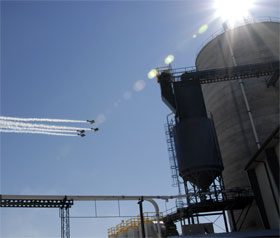 Well over 600 people were on hand for the grand opening of Missouri Ethanol on Monday in the small town of Laddonia, Missouri – which only has a population of 600!
Well over 600 people were on hand for the grand opening of Missouri Ethanol on Monday in the small town of Laddonia, Missouri – which only has a population of 600!
Flying over head to kick-off the event was the 100 percent ethanol-powered Vanguard Squadron, and at the podium to praise the farmer owners of the plant for their dedication and perseverance were state and national government officials and organization representatives.
“This is more than just the city of Laddonia,” said US Congressman Kenny Hulshof (R-Mo). “This is the future of farming.”
Listen to Hulshof’s full remarks:  Kenny Hulshof (5 min MP3)
Kenny Hulshof (5 min MP3)
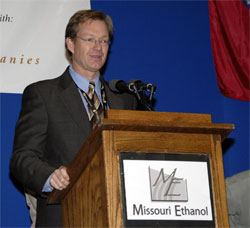
Also speaking at the event were US Senator Jim Talent of Missouri, several state legislators, and the leaders of both the American Coalition for Ethanol and the Renewable Fuels Association.
RFA president Bob Dinneen welcomed Missouri Ethanol to “the fastest growing energy industry in the world – the US ethanol industry.” Brian Jennings with ACE noted that ethanol is now blended with 40 percent of the of the nation’s fuel.
Missouri Ethanol is the nation’s 105th ethanol biorefinery now open with over 40 more under construction. It is the fourth plant for Missouri.
 The Andersons, Inc. of Ohio has begun preliminary site work for an ethanol plant located in Greenville, Ohio.
The Andersons, Inc. of Ohio has begun preliminary site work for an ethanol plant located in Greenville, Ohio.

 Well over 600 people were on hand for the grand opening of
Well over 600 people were on hand for the grand opening of 

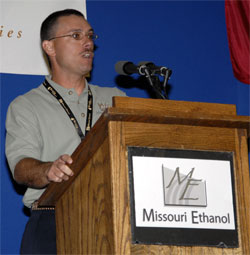 The General Manager of Missouri Ethanol is Robin Venn. He’s currently in the process of getting his house sold in Kansas City so he can move to the Laddonia area.
The General Manager of Missouri Ethanol is Robin Venn. He’s currently in the process of getting his house sold in Kansas City so he can move to the Laddonia area.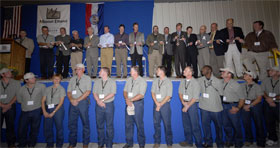 The grand opening event for
The grand opening event for  The
The  While
While  Training on how to finance biofuels projects is the goal of
Training on how to finance biofuels projects is the goal of  I was very pleasantly surprised to see the price of gas in Columbia, MO yesterday.
I was very pleasantly surprised to see the price of gas in Columbia, MO yesterday. 
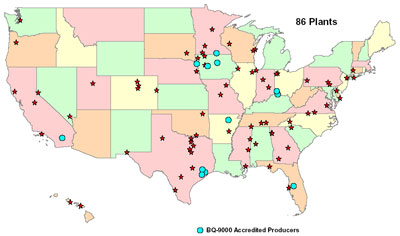 As the biodiesel industry continues to grow, the
As the biodiesel industry continues to grow, the